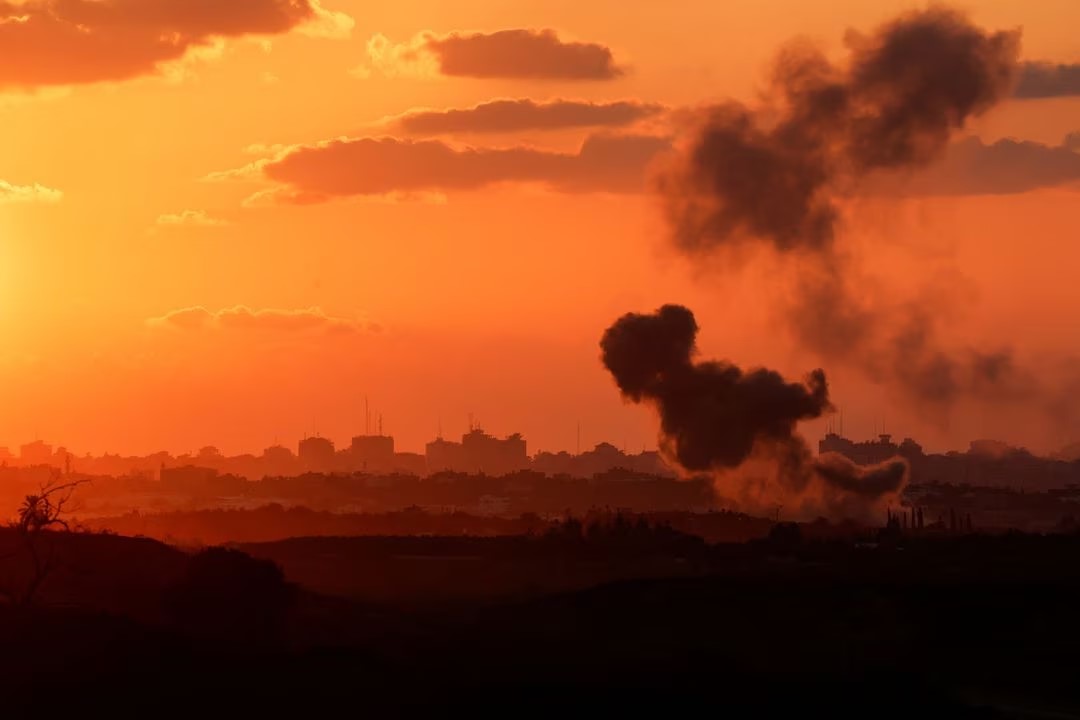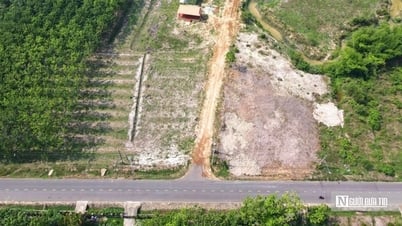Eight regional and Western officials said internally that Israel's military operation, dubbed "Operation Iron Sword," would be unprecedented in scale and would be completely different from past operations Israel has conducted in Gaza.
Israel has mobilized 360,000 reserve soldiers and has been bombing the Gaza Strip relentlessly since Hamas launched an attack that killed 1,400 people on October 7.
Israel’s immediate plan is to destroy Gaza’s infrastructure, three regional officials familiar with discussions between the United States and Middle East leaders said. To do so, they may have to inflict heavy civilian casualties, push residents of the enclave toward the Egyptian border and attack Hamas by destroying the tunnels it has built to conduct its operations.
However, Israeli officials have said they have no clear plans for the future after the war.
Some advisers to US President Joe Biden have raised concerns that while Israel may have a plan that would be effective in terms of causing lasting damage to Hamas, it has yet to devise an exit strategy.
During visits to Israel this past week, US Secretary of State Antony Blinken and US Secretary of Defense Lloyd Austin stressed the importance of focusing on devising a post-war plan for Gaza.
Arab officials are also concerned that Israel has not laid out a concrete plan for the future of the enclave.
“Israel has no final plan for Gaza,” a regional security source said. “Their strategy is to drop thousands of bombs, destroy everything and send in troops, but then what? They have no withdrawal plan for the days after that.”
An Israeli invasion has yet to begin, but Gaza authorities have said 3,500 Palestinians have been killed in air strikes, a third of them children - the highest casualty toll in the conflict between Hamas and Israel to date.
During a visit to Israel on Wednesday, Mr. Biden asserted that Hamas must face justice, but he also warned Israel not to repeat the mistakes the United States made after the 9/11 disaster.
“The majority of Palestinians have nothing to do with Hamas. Hamas does not represent the Palestinian people.”
Aaron David Miller, a Middle East expert at the Carnegie Endowment for International Peace , said Biden's visit to Israel gave him an opportunity to urge Israeli leader Benjamin Netanyahu to think about issues like the use of proportionate force and come up with a plan for Gaza before sending troops there.
“City of Tunnels”
Israeli officials including Mr Netanyahu have vowed to destroy Hamas in response to the October 7 attack, the deadliest in Israel's 75-year history.
Plans for subsequent decisions have not yet been thoroughly worked out.
“We are thinking about and dealing with this issue, and the activities related to assessments and requests for the participation of the National Security Council, the Israeli military and other agencies to come up with a plan to follow the end of the current situation,” said Tzachi Hanegbi, chairman of Israel’s National Security Council. “We are not yet sure about the details of this plan. But we know for sure which side will no longer exist after the end of the situation.”
However, those plans are easier said than done.
“This is an underground city of tunnels,” a regional source commented, referring to Hamas’ tunnels. “They won’t be able to destroy Hamas with just tanks and firepower.”

Photo: REUTERS/Amir Cohen.
Two military experts in the region said Hamas's military wing, the Ezzedine al-Qassam Brigades, had begun mobilizing for an Israeli invasion of Gaza, laying anti-tank mines and booby traps to ambush soldiers.
The upcoming Israeli offensive is expected to be larger in scale than previous campaigns in Gaza that officials have called “lawn-cutting operations,” reducing Hamas’ military capabilities but not completely destroying the organization.
Israel has fought three wars with Hamas, in 2008-2009, 2012 and 2014, and carried out limited ground attacks in two of these campaigns, but unlike today's campaign, Israel did not declare at the time its commitment to completely destroy Hamas.
However, Washington does not feel optimistic about Israel's ability to completely destroy Hamas, and US officials also see little chance that Israel will want to control Gaza territory or reoccupy the area.
According to US sources, the more likely scenario is that Israeli forces will kill or capture as many Hamas members as possible, destroy tunnels and missile factories, and when Israeli casualties begin to mount, find a way to declare victory and withdraw.
There are concerns in the region that the war could flare up and spread beyond Gaza, with Hezbollah in Lebanon and Iran increasingly offering fronts in support of Hamas.
Iranian Foreign Minister Hossein Amir-Abdollahian has warned of possible “preemptive” action against Israel if it invades Gaza. He said over the weekend that Iran would not just stand by if the US did not act to restrain Israel.
Arab leaders who spoke to Mr. Blinken after his repeated visits to countries in the region last week said that while they condemned Hamas' actions in Israel, they also opposed collective punishment of Palestinian civilians, and they were concerned that such actions would destabilize the region.
These leaders said public anger would explode across the region if casualties mounted.
Washington has sent a carrier strike group to the eastern Mediterranean amid concerns that Hezbollah could join the fight from Israel’s northern border, but there is no indication that the US military is shifting from a deterrent posture to a direct military engagement.
Regional sources say Washington is proposing to re-enforce the Palestinian Authority (PA), which lost control of Gaza to Hamas in 2007. However, international opinion remains skeptical about the ability of the PA or any other government to govern the enclave once Hamas is defeated.
Former US Middle East negotiator Miller has expressed skepticism about the potential for a post-Hamas government to run Gaza.
“The idea of bringing together the UN, the Palestinian Authority, the Saudis, the Egyptians, led by the US and the Europeans to transform Gaza from an extraterrestrial prison into something better exists only in some distant universe, not on Earth,” he said.
At present, the call for a humanitarian corridor in Gaza and a refugee route for Palestinians has received strong reactions from neighboring Arab countries.
They fear that an Israeli invasion of Gaza could spark a wave of mass, never-ending expulsions, similar to Israel's 1948 war of independence and the 1967 Arab-Israeli war. Millions of Palestinians have been forced to flee and have become refugees in countries willing to take them in.
Egyptian President Abdel Fattah al-Sisi said he rejected the decision to expel Palestinians from their homes to the Sinai Peninsula bordering Gaza. He said such actions would turn the region into a base for attacks on Israel. He also said millions of Egyptians would protest against the decisions.
East Jerusalem, which Israel captured and annexed in the 1967 war, and the expansion of Israeli settlements into the occupied territories are at the core of the conflict with the Palestinians. Netanyahu has openly religious and far-right views, promising to annex more territory for Jewish settlers.
Hundreds of Palestinians have been killed in the West Bank since the start of the year amid a series of clashes between Israeli troops and settlers, raising fears that violence could engulf the territory as Gaza burns.
One local source commented on the possibility of the conflict spreading beyond Gaza: “It will be worse than the worst case scenario you can imagine.”
Nguyen Quang Minh (according to Reuters)
Source




![[Photo] Launching ceremony and drawing of pairs for the "9th TIM CUP Highland Charity Football Tournament"](https://vphoto.vietnam.vn/thumb/1200x675/vietnam/resource/IMAGE/2025/5/31/a4c145af5d1e48c5b48c95116d41a73c)
![[Photo] Prime Minister Pham Minh Chinh attends the opening ceremony of the National Law Portal](https://vphoto.vietnam.vn/thumb/1200x675/vietnam/resource/IMAGE/2025/5/31/f02ed6288a4340bdb4adf1b2149b9614)




















![[Photo] General Secretary To Lam receives Chief of the Central Office of the Lao People's Revolutionary Party](https://vphoto.vietnam.vn/thumb/1200x675/vietnam/resource/IMAGE/2025/5/30/140435f4b39d4599a3d17975dfb444c5)







































































Comment (0)